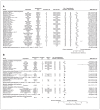The effect of interventions targeting gut microbiota on depressive symptoms: a systematic review and meta-analysis
- PMID: 34933877
- PMCID: PMC8695538
- DOI: 10.9778/cmajo.20200283
The effect of interventions targeting gut microbiota on depressive symptoms: a systematic review and meta-analysis
Abstract
Background: Despite their popularity, the efficacy of interventions targeting gut microbiota to improve depressive symptoms is unknown. Our objective is to summarize the effect of microbiome-targeting interventions on depressive symptoms.
Methods: We conducted a systematic review and meta-analysis. We searched MEDLINE, Embase, PsycINFO, Database of Abstracts of Reviews of Effects, Cochrane Database of Systematic Reviews and the Cochrane Controlled Register of Trials from inception to Mar. 5, 2021. We included studies that evaluated probiotic, prebiotic, synbiotic, paraprobiotic or fecal microbiota transplant interventions in an adult population (age ≥ 18 yr) with an inactive or placebo comparator (defined by the absence of active intervention). Studies must have measured depressive symptoms with a validated scale, and used a randomized controlled trial study design. We conducted a random effects meta-analysis of change scores, using standardized mean difference as the measure of effect.
Results: Sixty-two studies formed the final data set, with 50 included in the meta-analysis. Probiotic, prebiotic, and synbiotic interventions on depressive symptoms showed statistically significant benefits. In the single studies evaluating each of fecal microbiota transplant and paraprobiotic interventions, neither showed a statistically significant benefit.
Interpretation: Despite promising findings of benefit of probiotic, prebiotic and synbiotic interventions for depressive symptoms in study populations, there is not yet strong enough evidence to favour inclusion of these interventions in treatment guidelines for depression. Critical questions about species administered, dosage and timing relative to other antidepressant medications remain to be answered.
Study registration: PROSPERO no. 143178.
© 2021 CMA Joule Inc. or its licensors.
Conflict of interest statement
Competing interests: None declared.
Figures




References
-
- Powell N, Walker MM, Talley NJ. The mucosal immune system: master regulator of bidirectional gut-brain communications. Nat Rev Gastroenterol Hepatol. 2017;14:143–59. - PubMed
-
- Najjar S, Pearlman DM, Hirsch S, et al. Brain biopsy findings link major depressive disorder to neuroinflammation, oxidative stress, and neurovascular dysfunction: a case report. Biol Psychiatry. 2014;75:e23–6. - PubMed
-
- Maes M, Kubera M, Leunis JC. The gut-brain barrier in major depression: intestinal mucosal dysfunction with an increased translocation of LPS from gram negative enterobacteria (leaky gut) plays a role in the inflammatory pathophysiology of depression. Neuroendocrinol Lett. 2008;29:117–24. - PubMed
Publication types
MeSH terms
LinkOut - more resources
Full Text Sources
Medical
